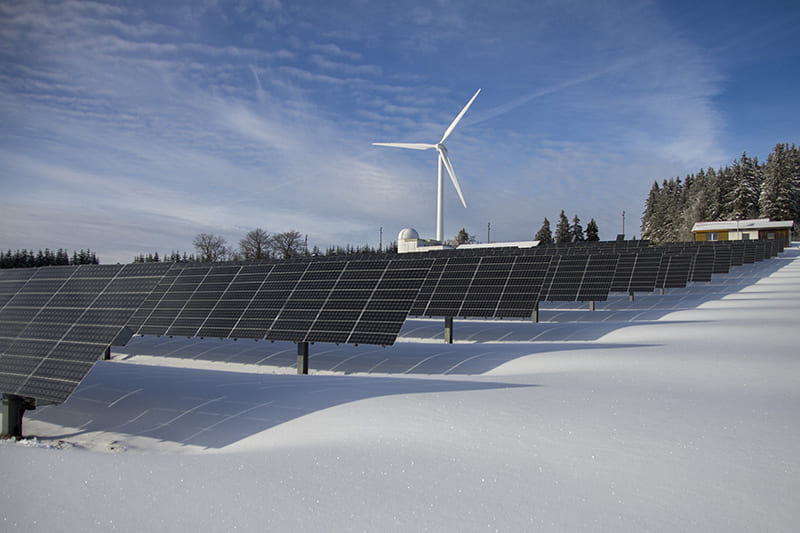
The reasons for switching to renewable energy sources vary among companies. While environmental responsibility is the primary motivation for many, some businesses make the shift because of the multiple ways renewable energy benefits their operations. But another less-often discussed advantage of sustainability is its benefits to the economy that translate to success and development of industries, companies, and individuals. Let’s look at some of renewable energy’s direct and indirect economic benefits.
Job creation
The renewable energy economy creates hundreds of thousands of jobs at all income and experience levels. From wind turbine service technicians and solar panel installers to sales and marketing roles and from engineers to manufacturing plant supervisors, many people earn their livelihood in sustainable energy positions.
According to E2’s 2021 report on clean jobs, more people in the United States work in clean energy jobs than as elementary and middle school teachers, farmers, real estate agents, or bankers. With more than three million jobs, renewable energy is the largest source of employment in the US’s energy sector, employing more than three times as many workers as fossil-fuel-related jobs. And these are more than just low-skill, low-pay roles. The median hourly wage for sustainable energy jobs is about 25% higher than the United States’ national median pay.
Renewable energy isn’t just protecting your neighbors’ air quality and climate; it’s providing them with numerous well-paying jobs.
Decreased energy costs
Commercial, industrial, and residential customers can use sustainable energy to lower their bills, meaning they have more money to spend on essentials, save for the future, invest in themselves, or spend with other businesses. All of that means economic stimulation.
Fossil fuels still have their place in our economy. The world isn’t yet able to generate 100% of its energy needs from sustainable sources. But green energy capacity continues to grow, and prices continue to drop. According to the International Renewable Energy Agency, half of all new wind and solar installations in 2019 were cheaper than fossil fuel generation. Gone are the days when green energy was a luxury item. It now competes directly with fossil fuels.
That means that thoughtful integration of green power into your business’ energy plan can lower your bottom line. If you need help understanding how to source green energy or get the most cost-effective mix of sustainable and traditional energy sources, consider working with a renewable energy consultant. They can help you understand the various plans and options available to you to determine which best fits your needs.
Energy independence
When your energy is generated locally, your company and your country depend less on foreign oil and international governments. The Centre for Economic Policy Research, a network of European policy researchers, examined the effects of Russia’s invasion of Ukraine on European energy markets. That situation offers an example of the perils of heavy reliance on foreign energy sources.
In the first five months of the conflict, the price of wholesale electricity in Europe increased a staggering 237%. For European countries that relied heavily on Russian-sourced energy, there was little that they could do to mitigate the price increases.
When your energy comes from local solar, wind, or water sources, the decisions of foreign governments or the conditions in another nation can’t have an outsized effect on your prices.
Mitigation of climate disasters and their massive price tags
The 2016 Fort McMurray wildfires in Canada cost an estimated $4 billion. Alberta’s 2020 hailstorm’s damages came in at $1.2 billion. As climate change continues to wreak havoc on weather patterns, these expensive extreme-weather events will continue to occur. That pulls money away from improvements and funnels it back into repairs.
Switching to renewable energy will help slow the pace of climate change, beating back the accelerating pace of climate-driven disasters. The emotional toll and loss of life resulting from these events is immeasurable. But we can measure the financial cost, and the numbers are enormous. Preventing more of these disasters means less money will go toward rebuilding, leaving more money to invest in moving forward. Among other things, that means more investment in infrastructure, including green energy projects.
Increased property values
Installing solar panels or wind turbines on your property provides you with sustainable, reliable power at a predictable rate. But the benefits don’t stop there. It also increases the value of your property. In that sense, purchasing sustainable energy-generation equipment is an investment in your business. Not only does it drive down your energy costs today, but it becomes an asset that adds value to your property, and makes it attractive to future property buyers.
Growth of landowner income
Rural landowners and farmers can use sustainable energy to diversify their businesses. They can create additional sources of income by leasing their land for solar or wind energy generation or through growing crops specifically for use as biofuels. These additional revenue streams can help struggling farmers stay afloat or bring much-needed investment and cash infusions to smaller, struggling communities.
When you shift your business’s energy procurement strategy to include more sustainable energy sources, you benefit your company, the environment, and the greater economy. While the direct economic benefits are touted less than the environmental factors and the positive effects on companies, they are no less significant. Learn more about the best first step for your organization to drive these positive changes by talking to a renewable energy consultant. They can help you develop a plan that will work for your unique needs.
Others articles you might like
7 ways sustainability benefits your business
With everything from the news to water-cooler conversations revolving around climate change and the environment, it's no surprise busines...
6 February 2024Six advantages of green energy and microgeneration for companies
Most companies rely partly or entirely on non-renewable fuels, such as coal, oil, and natural gas, to heat and cool their facilities and to ...
9 January 2024Short-term vs long-term energy contracts: How to decide which is best for your business
Your electricity procurement can have a substantial impact on your business's bottom line, which means there’s a lot to consider when it'...
21 December 2023



